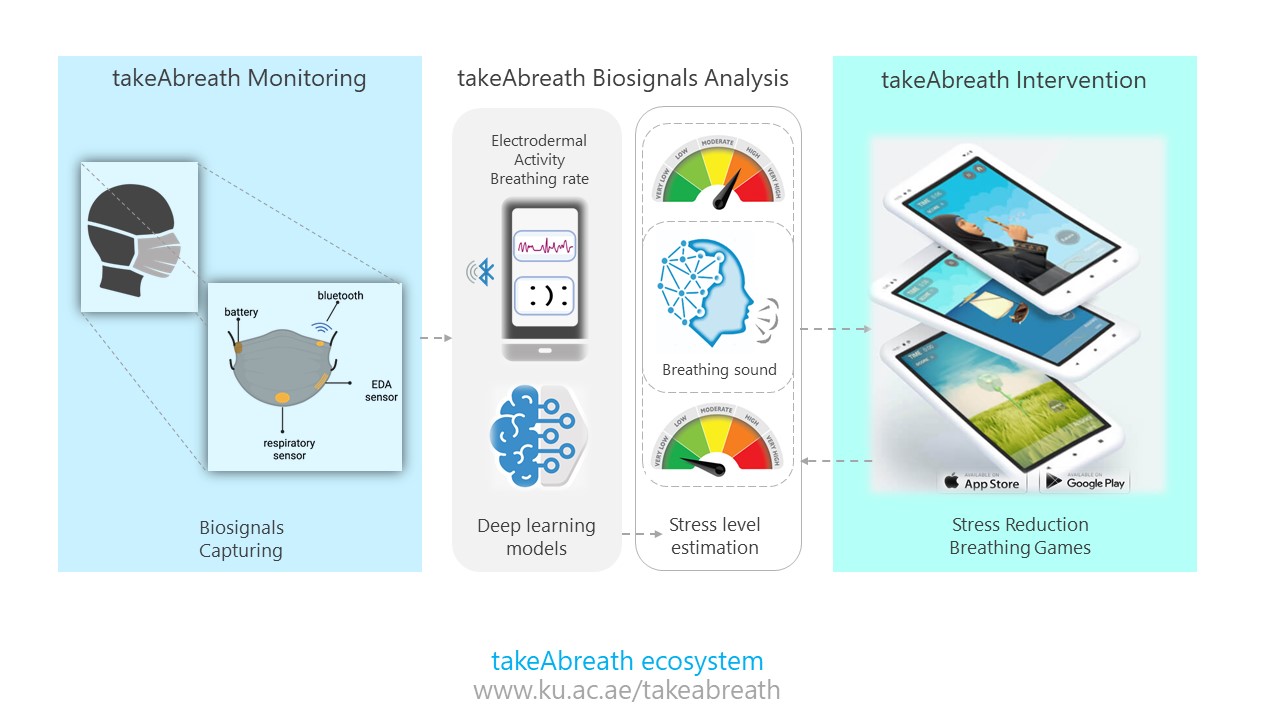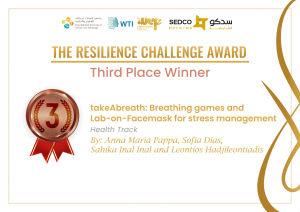
The takeAbreath facemask combines sophisticated machine learning with advanced sensors and gamification to address the stress and anxiety levels brought to the surface by the Covid-19 pandemic.
Not only does their facemask help monitor stress, it is linked to a smartphone app that offers breathing games to help reduce stress levels.
Dr. Anna-Maria Pappa, Assistant Professor, Dr. Sofia Dias, Research Scientist, and Prof. Leontios Hadjileontiadis, Biomedical Engineering Department Chair, collaborated with Dr. Sahika Inal, King Abdullaziz University of Science and Technology, to develop a smart mask that monitors stress and offers intervention techniques, including games and breathing exercises, to the user. Out of 314 applications from all over the world, the innovative mask won third place in the Women to Impact 2022 WEP Resilience Challenge.

The Women to Impact Resilience Challenge, organized by the King Abdullah University of Science and Technology (KAUST), is aimed at individuals and teams from around the world with technology-based solutions that help local ecosystems build resilience to real-world challenges such as climate change, disasters, epidemics, food insecurity, and environmental degradation. The Khalifa University team entered the Health track which required their solution tackle ‘the prevention, detection and treatment of diseases and pandemics.’
The takeAbreath team received a prize of USD 5,000 for their solution in an award ceremony held on the 20th of January.
“Covid-19 exacerbated the psychosocial effects that put adults at high risk for chronic depression and anxiety,” Dr. Pappa explained. “The need for continuous stress monitoring and stress management is timelier than ever. But emotional expression is hampered by the face mask that became a necessary protective accessory during the pandemic. Our takeAbreath solution transforms a simple mask to a smart ‘Lab-on-Facemask’.”
Sensors in the facemask recognize physiological signals related to stress and anxiety, including breathing patterns and variations in the electrical conductance of the skin, known as electrodermal activity (EDA). Research shows that both breathing and EDA signals can be indicative of the intensity of our emotional state.
“When physiological signals are transferred to a smartphone app via Bluetooth, our algorithms perform deep data analysis using trained deep learning models to identify the stress or anxiety levels of the user,” Dr. Dias explained. “Once this has been determined, the app offers personalized breathing games and exercises to the user, controlled by the users’ breathing sounds.”
“Recent work published in the Lancet revealed that in 2020, cases of major depressive and anxiety disorders increased by 28 percent and 26 percent respectively, notably in countries with high Covid-19 infection rates,” Prof. Inal said. “With the social distancing requirements preventing traditional doctor’s office visits and diagnoses, we need technological advancements to help support mental health. Our smart facemask concept with its integrated real-time stress-sensing capabilities offers that support.”
The takeAbreath facemask combines sophisticated machine learning with advanced sensors and gamification to address the stress and anxiety levels brought to the surface by the Covid-19 pandemic. Beyond the pandemic however, as facemasks seem likely to remain an accessory to everyday life, continuous monitoring of stress and anxiety can help users maintain better mental health throughout their lives.
“Overall, our approach builds on existing studies where respiratory patterns and electrodermal activity have been successfully employed, either separately or in combination, in assessing the mental state of individuals and proposing suitable intervention strategies,” Dr. Pappa said. “We incorporated a sensing framework into a wearable facemask linked to a smartphone for real-time continuous measurements and to provide stress management through breathing games and exercises.”
Breathing exercises have long been recommended for reducing stress levels as they increase oxygen exchange, which reduces blood pressure, slows the heart, and releases any tension held in the abdomen. These physical changes also benefit the mental state as focusing on breathing can bring patients back to the present and to a state of mindfulness. While breathing exercises may not be a full stress management technique, they are clinically proven to lessen the symptoms of stress and anxiety and can be employed whenever and wherever needed.
“takeAbreath showcases the skills of the KU Department of Biomedical Engineering faculty to approach health problems by normalizing the technology to the user’s everyday living customs and turning simple means, such as a mask, to a smart health monitoring sensor. This line of research, by involving gamified interventions, exemplifies to the young students the way they could think in order to provide innovative solutions to GLocal problems, such as stress, anxiety and Covid-19 pandemic” Prof. Hadjileontiadis, Chair of BME, highlights.
Jade Sterling
Science Writer
6 April 2022